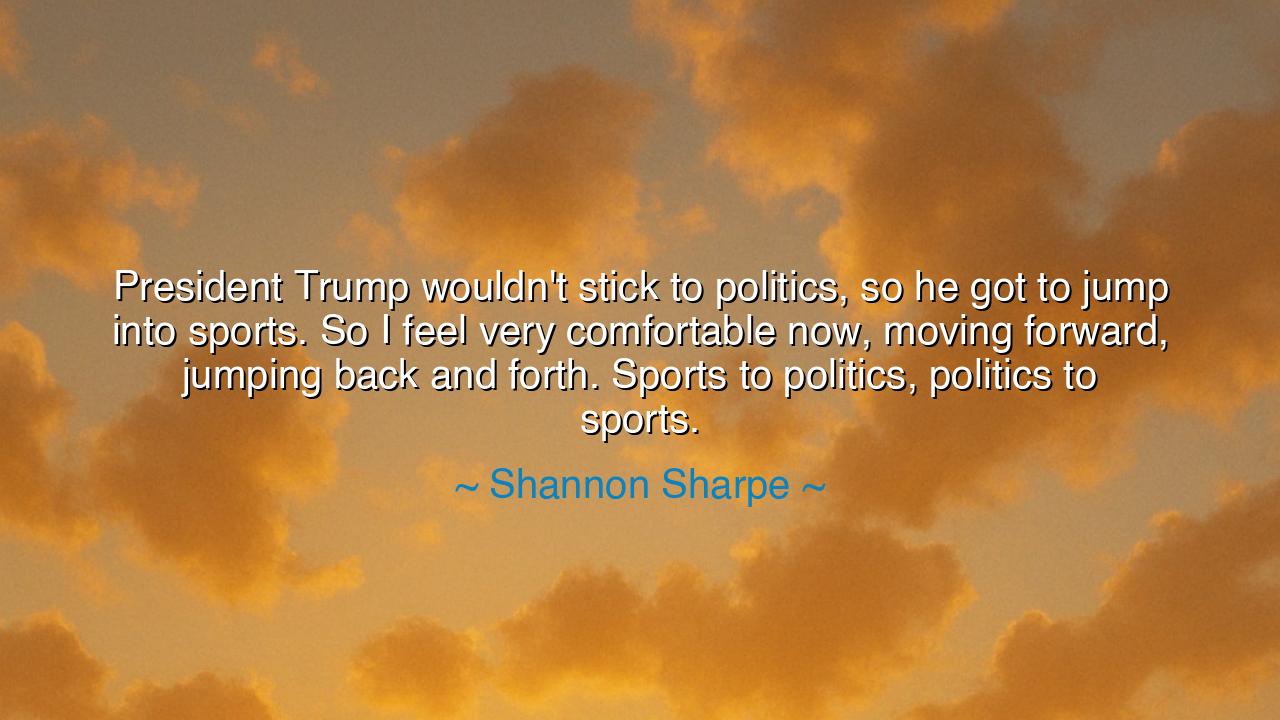
President Trump wouldn't stick to politics, so he got to jump
President Trump wouldn't stick to politics, so he got to jump into sports. So I feel very comfortable now, moving forward, jumping back and forth. Sports to politics, politics to sports.






The words of Shannon Sharpe carry both boldness and revelation: “President Trump wouldn't stick to politics, so he got to jump into sports. So I feel very comfortable now, moving forward, jumping back and forth. Sports to politics, politics to sports.” Here, Sharpe unveils a truth of our age — that the walls once separating the realms of public life have fallen. Where once men of the sword stayed to the battlefield, and men of the pen stayed to the scroll, now leaders, athletes, and citizens stride freely between sports and politics, between culture and governance, between the games of men and the destiny of nations.
The meaning is profound: sports and politics are not strangers. Both are arenas of competition, of vision, of passion. In sports, athletes clash for victory, and the world watches, inspired or divided. In politics, ideas clash, and the future of nations hangs in the balance. When Sharpe says he is comfortable moving between these realms, he is recognizing that both demand the same qualities — courage, strategy, resilience, and the will to influence hearts. Just as an athlete can stir a stadium to roar, a leader can stir a nation to rise.
Consider the story of Muhammad Ali, who stood not only as a champion in the boxing ring, but also as a warrior for justice outside of it. When he refused the draft during the Vietnam War, declaring, “I ain’t got no quarrel with them Viet Cong,” he was punished, scorned, and stripped of his title. Yet his stand reverberated louder than any punch he ever threw. His courage proved that an athlete could cross into politics, that his voice could shake governments as surely as his fists shook opponents. Ali embodied the very principle Sharpe describes: the seamless movement between games of body and games of power.
Sharpe’s mention of President Trump is another illustration. Here was a man whose stage was once business, then politics, yet who entered the arena of sports commentary with the same fire, speaking on athletes who knelt during the anthem, on teams who defied him, on symbols of loyalty and patriotism. Whether one agreed or disagreed with him, his presence blurred the line between what is political and what is athletic. It showed that sports are never only sports; they are mirrors of society, stages where battles over identity, justice, and pride are fought.
The ancients knew this truth. In Greece, the Olympic Games were not merely contests of strength, but sacred events tied to religion and politics, binding city-states in rivalry and unity. Victors were celebrated not only as athletes, but as heroes who brought honor to their people. The athlete and the statesman were kin, each carrying the weight of their people’s pride. When Sharpe speaks of moving freely between these worlds, he echoes the rhythm of the ancients, who never separated the glory of the body from the duty of the polis.
The lesson is this: do not believe that your influence must stay within one realm. If you have strength, let it serve both the field and the forum. If you have a voice, use it not only to celebrate victory, but to cry out against injustice. Life is not made of neat compartments, but of flowing rivers, where courage in one stream can pour into another. As Sharpe has shown, and as Ali once proved, the courage of the athlete can become the courage of the citizen, and the influence of the political leader can shape the world of sport.
So, children of tomorrow, hear this teaching: move without fear between the worlds that call to you. Do not say, “I am only an athlete,” or “I am only a worker,” or “I am only a leader.” Each of you carries the capacity to leap, to cross boundaries, to shape more than one stage of life. Speak in the stadium, and let your words echo in the senate. Act in the halls of power, and let your choices inspire the fields of play. For the true strength of a person lies not in remaining bound to one realm, but in weaving them together for the good of all.
Thus, Sharpe’s words are not merely about sports and politics; they are about the unity of life. They remind us that courage, influence, and vision do not belong to one domain but to all who dare to use them. And so we must live as whole beings, leaping where the call arises, ready to fight in every arena that shapes the destiny of mankind.






AAdministratorAdministrator
Welcome, honored guests. Please leave a comment, we will respond soon